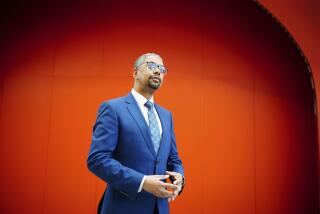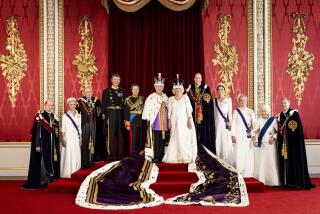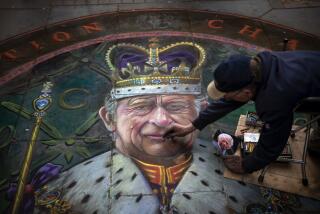Defining Britishness
London â PATRIOTISM MAY BE the last refuge of scoundrels, but it is also often the rhetoric of first resort for racists and right-wingers. Thatâs why itâs so significant that a growing number of prominent liberal -- and nonwhite -- Britons are promoting national pride as a way to encourage social cohesion in this increasingly diverse nation.
The demand for such solidarity comes in reaction to recurring race riots, increased immigration, the devolution of Britain into semiautonomous parts and, of course, last Julyâs London bombings, all of which have ignited a national debate over what it means to be British in the 21st century. One survey shows that a large percentage of Brits are worried that âBritain is losing its own culture.â A poll published last weekfound that one in five voters would consider casting ballots for the nativist, extreme-right British Nationalist Party, mostly out of concern over the nationâs growing racial diversity.
John Sentamu, the Ugandan-born archbishop of York, is one liberal seeking to counter such extremism. On the front page of last Mondayâs Times of London, a powerful photo showed Sentamu performing a full-immersion baptism, clasping the hands of a 19-year-old white woman as she emerged drenched from an inflatable pool. The story that accompanied the picture was about the archbishop reviving an ancient religious rite, but the subtext was about the fact that a black man had become an arbiter of Church of England tradition.
Sentamu, the outspoken No. 2 man in the church, has ruffled plenty of feathers since he was installed as an archbishop last fall. In February alone, he drew criticism for praying at a Sikh temple and for comparing the human rights record of President Bush to that of the late Ugandan dictator, Idi Amin. But it is his criticism of multiculturalism that has provoked the most significant controversy. The term, he says, has come to imply that everyone but the English are encouraged to be proud of their cultures.
For a generation, multiculturalism -- the ideology that encourages the coexistence of separate but equal cultures in one place -- has been anathema to conservatives. But among liberals, there has been an unspoken consensus in its favor; for most of them, âintegrationâ has been a dirty word. Today that consensus is falling apart, and Sentamu is helping it fracture.
As a way of subverting white racist rhetoric and politics, he has called on the majority -- white Britons -- to rediscover their identity and to not be embarrassed about âsome of the good things they have done.â A naturalized British citizen, Sentamu says he âhas loved English cultureâ since he was a child and tells the majority population that it is his job âto simply remind you of what you taught me.â
Sentamu isnât alone. Britainâs race czar, Trevor Phillips, the chairman of the Commission for Racial Equality, an extra-governmental body funded by the Home Office, routinely calls for the demise of multiculturalism. Phillips, who was born in London to Afro-Caribbean parents, argues that the times now require a greater emphasis on creating a greater national whole out of diverse Britain.
âWe have turned something that was very positive 20 to 25 years ago into something negative and conservative that holds back the process of integration rather than encourages it,â he said.
Like Sentamu, Phillips is not advocating cultural homogenization. His beef is not with the reality of multiculturalism but with the ideology.
As part of the nationâs multicultural policy, local governments parceled out money to ethnic organizations such as, say, a Bangladeshi sewing club or a Pakistani youth group. Not only has this system fostered competition among ethnic groups and resentment from whites, it has, according to Phillips, made it âadvantageous to stay different.â He said: âWe were rewarding people for their heritage.â
Largely under Phillipsâ leadership, the commission has gone from dealing almost exclusively with anti-discrimination enforcement and defending minority rights to developing broader policies that encourage social integration and foster a shared sense of Britishness.
While Phillips has drawn the ire of the far left, he has found support among his center-left Labor Party colleagues. Like Phillips, Sunder Katwala, the general secretary of the Fabian Society, a Labor-aligned think tank, believes that pluralism is inherent in the concept of Britishness, and so why not foster Britishness rather than its constituent parts? A self-described âmongrel Britâ and âproduct of the rise and fall of the British Empire,â Katwala, the 32-year-old whiz-kid son of an Indian father and an Irish mother, argues that for a generation the âpolitics of recognitionâ have overshadowed liberalsâ traditional concern with equality.
âWe need to create a progressive notion of integration and make it compatible with our goal of equality,â he said.
There are signs that the public might welcome a new model of integration. A 2002 conducted by the research firm Ipsos Mori found that 86% of Britons disagreed with the notion that to âbe truly British you have to be white.â And although there was no consensus as to what Britishness means in practice, a majority of whites and ethnic minorities agreed that immigrants âshould have citizenship lessons about the British way of life,â according to the poll.
Massive global migration is forcing countries throughout the world to find strategies to deal with the tensions and stresses caused by increased diversity. The emergence of a new British model suggests that the reality of multiculturalism is undermining the need and rationale for the ideology.
More to Read
Sign up for Essential California
The most important California stories and recommendations in your inbox every morning.
You may occasionally receive promotional content from the Los Angeles Times.










